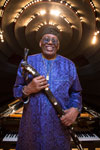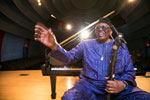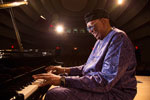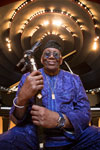|
Down Beat
Magazine
August 2016
By Ted Panken
Photos by Jimmy Katz
Downbeat Hall of Fame
Randy Weston
When DownBeat last spoke to RANDY WESTON in the summer of 2014, the master pianist-composer, then 88, was planning to issue
 The African Nubian Suite, The African Nubian Suite,
a recent opus he'd recorded in concert at NYU's Skirball Center in April 2012.
For that occasion, documented on a self-released double CD, Weston convened an array of distinguished Afrocentric artists - including an expanded, fivehorn version of his African Rhythms ensemble; various percussionists, string playersand singers; and the late Jayne Cortez intoning a commissioned poem in her singular argot - to illuminate a text narrated by Wayne B. Chandler, author of Ancient Future: The Teachings and Prophetic Wisdom of the Seven Hermetic Laws of Ancient Egypt.

As historian Robin D.G. Kelley accurately observes in the program notes, "In one single work, Weston manages to pay tribute to the ancient tombs of Sidi Bilal in Aswan, the Sufi tradition, the holy city of Touba in Senegal, China's great Shang dynasty, African folk music, the timeless history of the blues, and the unity of humankind." Weston dialogues with each participant in notes and tones, and emcees from the piano bench, revealing exhaustive knowledge of how the traditions intersect.
'We Have To Go All the Way Back'
On the occasion of his induction into the DownBeat Hall of Fame and about a month after his 90th birthday. Weston discussed this summational piece over brunch in the art-filled dining room of his home in Brooklyn's Clinton Hill neighborhood. He inherited the house from his father, who ran a restaurant on the premises from 1946 until the 1970s. Sitting with impeccable posture at the head of the table, Weston, who appears not to have lost an inch from his 6-foot 8-inch frame, followed his musical practice of stating a core motif, then fleshing it out with theme-and-variations of gradually increasing complexity and depth.
"My dad told me, 'Listen, we are older than corruption, we are older than colonialism, we are older than slavery; for you to understand me and your mother better, you've got to go back to Africa,'" Weston said. "So when I was a boy, I'd go to libraries and museums to read about Nubian civilization, the great Egyptian civilizations before there was a West Africa."
Weston originally conceived The African Nubian Suite as a large ensemble project. "That changed because of Jayne Cortez," he said. Weston explained that he'd seen a CNN piece on Ardi (Ardipithecus ramidus), the 4.5 million-year-old female hominid skeleton unearthed in the Ethiopian desert in 1994, and "wanted to honor that this lady is our original mother." He asked Cortez (1934–2012) "to write a poem about women, in particular the African woman, going all the way back. I wanted her to do it with African drums. She agreed. Then she called to say she wanted me to play piano behind her.
"I started to think about what magical process happened when the African came in contact with a European instrument. For example, I told Howard Johnson to describe on tuba how he imagined Ardi walked through the forest. I asked everybody to do the same with each individual instrument. For us to go ahead, we have to go all the way back, and find out how our ancestors created all this music. They were greater than us. It's an amazing story."
Weston's own amazing story is comprehensively documented in his 2010 autobiography African Rhythms (with co-author Willard Jenkins) and in a lengthy chapter in Kelley's 2012 book Africa Speaks, America Answers: Modern Jazz in Revolutionary Times. Weston's achievements will be further illuminated after the summer, when he transfers his extensive archives - containing 70 years' worth of manuscripts, recordings and printed ephemera - to Harvard University. But as his latest album indicates, Weston enters his 90s with no intention of shifting into retrospective gear. In his forward-looking attitude to musical production, he embodies the "ancient future" paradigm practiced by jazz icons such as Max Roach, Thelonious Monk and Dizzy Gillespie - all of whom were hands-on mentors during his formative years - and early heroes like Duke Ellington, Coleman Hawkins and Count Basie.
 As we spoke, Weston was preparing tofly to Morocco, his second home since 1967, to play with African Rhythms at the Gnaoua World Music Festival in Essaouira, to be followed by summer festival appearances at Spoleto, Montreux, Jazz à Vienne and Detroit. In January, he attended the Panama Jazz Festival, which dedicated this year's edition to him in recognition of his father's Panamanian roots. As we spoke, Weston was preparing tofly to Morocco, his second home since 1967, to play with African Rhythms at the Gnaoua World Music Festival in Essaouira, to be followed by summer festival appearances at Spoleto, Montreux, Jazz à Vienne and Detroit. In January, he attended the Panama Jazz Festival, which dedicated this year's edition to him in recognition of his father's Panamanian roots.
On April 28, Weston assembled African Rhythms for the fifth and final public concert he'd curated during 2015 - '16 as the first-ever artist in residence at the New School for Jazz and Contemporary Music. The series began with a retrospective of Weston's life and career moderated by Kelley. It continued with separate events at which Weston played and spoke with traditional Gnawa musicians from Morocco and master drummers from Senegal, and a symposium on the evolution of the drum through the African diaspora, in which Lewis Nash interviewed drummers from Guadeloupe, Haiti, Trinidad, Morocco and Cuba who each spoke about their village, picked a song and played it with a specific rhythm.
Weston was far from blasé about his entrance into the DownBeat Hall of Fame. "I'm overwhelmed," he said. "I am so happy that I can't express it. See, the old people would say: 'Your destiny has already been written. You've been given certain powers at a certain time.' They said, 'The Creator will give you this, and the Creator will take it away. But what you deal with is music.' So I tried to take the best of everyone I heard. This is Randy Weston, who the piano teacher gave up on completely! I cut music class at Boys High School. I didn't become a professional until I was 29, because I had no confidence that I could even touch the feet of Tatum and Hines and these people I love with a passion.
"
I don't know how all this happened. I kept doing the same thing, telling the truth about our people." He mentioned his dear friend and musical alter-ego,
Melba Liston (1926 - '99), who extrapolated the harmonies and voicings of Weston's compositions for big bands and combos on such classic albums as
 Uhuru Afrika Uhuru Afrika
 Tanjah Tanjah
 The Spirits Of Our Ancestors The Spirits Of Our Ancestors
 Volcano Blues Volcano Blues
 Khepera Khepera
"We had that same quiet pride in Grandma and Grandpa, always liking to go back. Most people today don't know to go back. But I tell them the real power is the root of the tree. Not what you see. What's under the ground. Which is Mother Africa."
Weston paused, and said, "Also, I don't know anything!"
It was impossible not to respond, "Well, you know something."
He leaned forward. "But that something is so small when you're dealing with the magic of Africa, the magic of Cuba and Haiti," he said. "How all these Africans were taken away, and went like this" he placed his large hands in front of him as though manacled - "and did this" - he splayed his long, tapered fingers downwards, addressing an imaginary piano - "and did this" - moved his hands in a silent drumbeat - "and did this" - cupped his hands around his mouth as if blowing into a horn. "How did that happen? When I first went to Nigeria, I said, 'Do you know how blessed I am? My ancestors, my great-great-grandmother, came over on a boat from Africa, in chains.' Next week I'm going to Africa in an airplane. I can put myself in that slave ship. I can go back thousands of years. I can see myself before slavery. I can see myself before corruption. I can see my mother a queen. My father a king.'"
Weston has never traced his personal genealogy to an African location. His father, Frank Edward Weston, born in 1894, descends from Jamaican Maroons who emigrated to Panama for employment during the construction of the Panama Canal. During the 1910s, he moved to Cuba from Balboa, his hometown; in 1924, he sailed from Havana to New York. He settled in Brooklyn, where he met Weston's mother, Vivian, who had recently migrated from southeastern Virginia. Weston depicted the milieu of his formative years in the brilliant tune "African Village Bedford Stuyvesant," which concluded the recent New School concert, framing the harmonic language of Gillespie and Monk with Nigerian highlife beats.
 "I'm a combination of my parents," Weston explained. "My father, with his Panamanian - Jamaican roots - cooking, music, discipline, pride. My mother was quiet power - by example with the black church. They broke up when I was little. I'd be with my father during the week, and learned about Marcus Garvey, about Africa. On the weekend, my mother would take me to the movies, and on Sunday, take me to the black church, the most swinging place of all. We had calypso dances, blues groups on the corner. We could get lessons on piano or trumpet or violin in black institutions. Our parents took us to hear Duke, and Mary Lou Williams with Andy Kirk, and Jimmy Lunceford." "I'm a combination of my parents," Weston explained. "My father, with his Panamanian - Jamaican roots - cooking, music, discipline, pride. My mother was quiet power - by example with the black church. They broke up when I was little. I'd be with my father during the week, and learned about Marcus Garvey, about Africa. On the weekend, my mother would take me to the movies, and on Sunday, take me to the black church, the most swinging place of all. We had calypso dances, blues groups on the corner. We could get lessons on piano or trumpet or violin in black institutions. Our parents took us to hear Duke, and Mary Lou Williams with Andy Kirk, and Jimmy Lunceford."
He was 13 when Coleman Hawkins' iconic "Body And Soul" recording hit the streets. "I bought three copies, and kept two in cellophane," Weston said. "I tried to play his solo on the piano. He's the real deal for me. How do you go from Mamie Smith to Monk? I also tried to play like Basie. But only Basie had that sound, that touch, that when-not-to-play. He was also a stride pianist like Monk was a stride pianist, but they created something different. You take the black church, the calypso, the blues, Duke, Basie, Art Tatum, put them in a pot and stir them up, and add Africa: That's Randy Weston."
What also characterizes Weston, in pianist/ keyboardist Marc Cary's view, is an alchemical ability to put tone, texture and rhythm at the service of his stories. "I put Randy with Duke and Earl Hines, coming out of them into some futuristic stuff," Cary said. "He knows so much piano history, he can play whatever he wants. What he chose to be as a pianist fits what he's trying to do. He's not flamboyant. He approaches the instrument to communicate, through the language we know as jazz and beyond. And his left hand is always creating; all his songs have a dope bass line."
Danilo Pérez, who hosted Weston at the Panama Jazz Festival this year and in 2006, said he admires his "orchestral approach, so connected to the drums and the flow of rhythmic development." Pérez continued: "There's always a dance to his playing; he completely controls the motion of the groove. There's also the gravity of his sound, like nobody else. You can copy one of his chords, but it doesn't sound the same. Like Monk and Duke, he creates compositions that stay with you, that feed his persona as an improviser, and always sound like a blues song. His music is so inclusive; you feel like you're in a tribe."
Unlike most of his generational peers, Weston steered away from bebop. "I loved Bud Powell, but not to play like him," he said. "That wasn't my way. I was closer to blues pianists. I adored Nat Cole, too." After hearing Monk's recorded debut on a 1944 Hawkins quartet recording, Weston said he "realized that Monk was the direction I wanted to go, and back to Ellington, back to Basie. Lester Young always said, 'What's your story?' That's the AfricanAmerican tradition. These giants had maybe four bars or eight bars to take a solo, but they had to tell a story, like the phrase Prez played on 'One O'Clock Jump' with Basie's band - or Freddie Webster, when he did 'You're Not The Kind' with Sarah Vaughan - but what a story!"
In 1944, Weston was a recent graduate of Brooklyn's Boys High School, playing local calypso dances and jump-band gigs. Then he was drafted into the Army. After an eventful tour of duty in which he rose to Staff Sergeant, he returned to Bed-Stuy in 1947 to take over his father's first restaurant, Trios, on Sumner Avenue, where he maintained a jukebox filled with everything from Satchmo to Stravinsky.
Max Roach, also a Boys High alum, lived nearby, and Weston took frequent breaks to visit. George Russell, then convalescing from tuberculosis in Roach's house, was working on "Cubana Be, Cubana Bop" for Gillespie's recently formed big band, sometimes joined by Gillespie himself and trailblazing Cuban conguero Chano Pozo. Russell introduced Weston to Schoenberg's Pierrot Lunaire, which struck him as "interesting but kind of cold," and also to the corpus of Alban Berg, which affected Weston deeply.
Concurrently, Weston started to compose tunes, earning validation on an occasion when Roach, hosting Charlie Parker, his employer on 52nd Street, asked Weston to "play something for Bird," who responded favorably.
 "I'd sit and absorb what these giants said," Weston said. "I had no idea I'd be a musician. My father, God bless him, wanted me to be a businessman. He wanted his son to be independent. Pop was fully aware of the racism in New York - in America, period. Segregation was serious! Even in Manhattan, we couldn't go to restaurants. But Mom and Pop kept that spirit." "I'd sit and absorb what these giants said," Weston said. "I had no idea I'd be a musician. My father, God bless him, wanted me to be a businessman. He wanted his son to be independent. Pop was fully aware of the racism in New York - in America, period. Segregation was serious! Even in Manhattan, we couldn't go to restaurants. But Mom and Pop kept that spirit."
Another transformative breakthrough occurred in 1951 at the Music Inn in the Berkshires, where Weston took a summer job as a breakfast chef. After completing his daily obligations, he played piano in the evenings. "Three older ladies told me they were having a recital, and wanted me to play," he recalled. "I told them I didn't play Bach or Beethoven, but they said, 'No, we want to hear what you play at night.' Then I realized I had something to say on the piano. But I was still very shy."
Not long thereafter, Weston met the pioneering jazz historian Marshall Stearns, a bespectacled Caucasian professor of English with degrees from Harvard and Yale who specialized in medieval literature. Stearns conducted colloquia at the Music Inn that offered a university-level education in the threads that connect jazz to the traditional music of the ethnic groups and regional styles of West Africa. "Marshall was the squarest-looking guy you'd want to see," Weston said. "But he was PanAfrican. He encouraged me to listen to older pianists like Jimmy Yancey and Meade Lux Lewis, who approached their instruments in a way closer to Africa. He brought in Macbeth the Great, a famous calypso singer, and I heard the French quadrille, which inspired me to start writing waltzes. He brought in John Lee Hooker and Jimmy Rushing, and did a 15-minute interview with Mahalia Jackson on African spirituality in the black church."
On another occasion, Stearns arranged for a presentation by ethnomusicologist Willis James, who played field hollers that proceeded in 5/4 time; dancers Asadata Dafora and Katherine Dunham presented possibilities for sounds in motion; drummers Babatunde Olatunji and Candido authoritatively executed the rhythms for all to see and emulate.
Eventually, Stearns invited Weston to accompany his popular lecture demonstrations. After he suffered a heart attack in 1958, he asked Weston to deliver them. On Stearns' recommendation, the U.S. State Department recruited Weston - who had visited and played in Nigeria in 1961 and 1963 - to bring a group to tour in West Africa and North Africa at the beginning of 1967. "That's when I realized I was an ambassador," Weston said. "Marshall died before I had a chance to thank him. He taught me how to do the history of jazz."
It could be said that, circa 2016, Weston - lineally connected to a timeline spanning Eubie Blake and Luckey Roberts to Ornette Coleman and David Murray - embodies the history of jazz in his own person. After soundcheck for the final New School concert, he stretched out on a sofa in the compact dressing room, listening to saxophonist/flutist T.K. Blue, bassist Alex Blake, percussionist Neil Clarke and tenor saxophonist René McLean trade stories about Slugs' Saloon and the dangers of navigating Manhattan's Lower East Side during the '60s and '70s. When directly addressing Weston, they called him "Chief."
"It's not something he claims," Clarke said of the designation. "Randy is a chief by acclamation. He's so generous, so inquisitive, so unflinching in his love and respect and appreciation for Africa. He'll tell you the story of the creation of every single one of his songs, and the approach shifts. You don't play licks or patterns. You participate in telling that story."
Clarke has propelled African Rhythms for 20 years, sometimes within a uniquely configured percussion setup assembled from congas, djembe, cymbals and tambourine, sometimes playing alongside a drum kit player, sometimes not, always in uncanny synchronicity with Blake, whose approach to the bass evokes the guembri, a low-tuned Gnawan lute.
Weston told Pérez that using Clarke as sole percussionist provides him space to create harmonic color. "They all have digested the language, and that raises the level of freedom," Pérez said. "When I hear the trio, I sometimes don't know who's soloing. They break down any preconceived idea about interaction, and connect it to the experience of the African neighborhood."
Indeed, it is impossible not to notice how spontaneous and unpredictable Weston is, how rarely he repeats himself. He was asked how he sustains this optimistic, fresh perspective. He pointed to Fatoumata Weston, his Senegaleseborn wife, whom he met in Paris in 1996.
"Why me?" she asked him. "What did I do?" "Every minute, I'm in Africa with her," Weston said. "Everything she does - what she thinks, what she cooks, the clothes she makes for me - is African. And she's from a spiritual family. I have a Senegalese family. Her daughter's children treat me as Grandpa. So even if I try to go off the path, I can't, because there's my wife. She's constantly giving. I can't overemphasize the importance of that. Dizzy would give. Eubie Blake. Duke. Max. Always giving. We got married in Nubia. The Creator said, 'This is your wife.' And I go with the flow."
DB -
Weston "
Reprinted with permission Copyright (c) 2016
Down Beat
Magazine, Jimmy Katz and Ted Panken
^
Top ^ |

